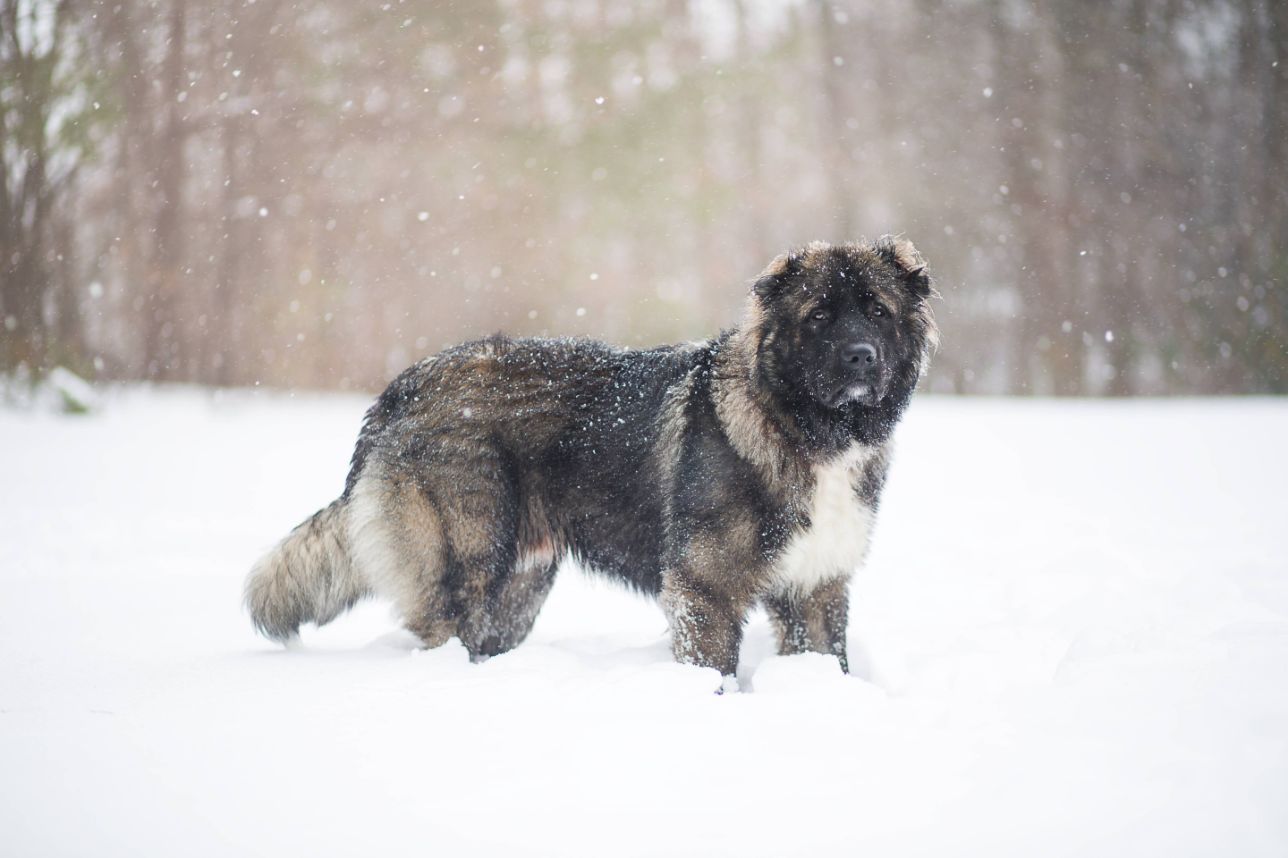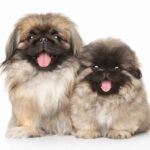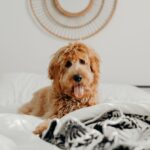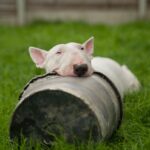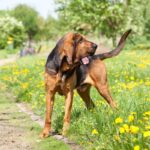German-born Leonbergers are renowned for their refined grace and calm patience. Due to their impressive strength, these working dogs excel at pulling carts, which is one of the many tasks they perform on farms and along the waterfront. Please continue reading if you’re interested in learning more about Leonberger puppies.
About The Breed
The Leonberger is a massive, lush-coated Germanic species. They enjoy the company of the entire family and have a kind disposition and calm patience.
Yes, the Leonberger is a large and powerful dog, but he is also renowned for his regal grace and elegance. A male can be as tall as 31 inches at the shoulders and as heavy as an adult human. Although they are still a lot of dogs, females tend to run smaller.
The breed is distinguished by its medium-length waterproof coat, lush triangular ears, bushy tail, and black facemask that frames its amicable dark-brown eyes. The mane around the neck and chest, which resembles a lion’s, is a striking aspect of the male’s coat. A Leonberger with good structure walks with an easy, elastic gait.
Leos are friendly, but they are not easily fooled. They are intelligent and sensible workers who serve as watchdogs. Leos require a lot of brushing, a lot of space to play, and an endless supply of affection.
Health
You must be aware of any potential health problems in your breed whether you plan to breed from your dog or consider purchasing a puppy. We advise breeders to use DNA tests, screening programs, and inbreeding coefficient calculators to help breed the healthiest dogs possible in order to address these issues.
Priority Health Schemes And Tests
The following guidelines, tests, and recommendations must be used by the Kennel Club’s Assured Breeders (or equivalents). It is strongly suggested that all other breeders use these as well.
- Hip dysplasia screening scheme (BVA/KC)
- Eye screening scheme (BVA/KC/ISDS)
- Elbow dysplasia screening scheme (BVA/KC)
- Eye testing – PLA (gonioscopy) (BVA/KC/ISDS)
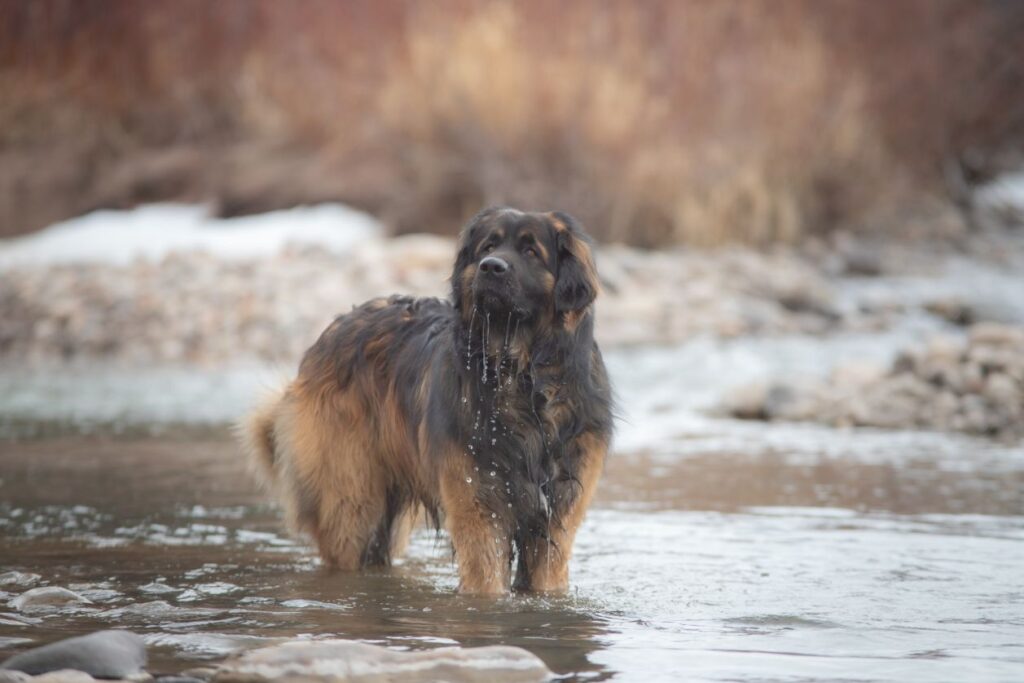
Important Health Schemes And Tests
We firmly advise all breeders, both assured breeders (ABs) and non-ABs, to use the following (or equivalent) schemes, tests, and recommendations.
- DNA test – LPN1
- DNA test – LPN2
- DNA test – LEMP
- Bitches not to produce a litter under two years of age
Common Health Problems
Breeders who practice responsible breeding work to uphold the highest breed standards as set forth by organizations like the American Kennel Club (AKC). These breeding guidelines reduce the likelihood of inheriting health issues in dogs. The breed, however, is susceptible to some inherited health issues. Be aware of these conditions:
- Gastric Dilatation-Volvulus (GVD): Often referred to as “bloat,” this potentially fatal condition affects a lot of large dog breeds. In order to trap the contents in the stomach and cut off blood flow to the stomach and spleen, it happens when the stomach is filled with gas or food and rotates afterward. The stomach can even rupture as the stomach tissue degenerates. You will need to use feeding strategies to minimize this risk.
- Hip Dysplasia: Large breeds are prone to hip dysplasia, instability of the hip joint that leads to excessive wear on the joint, and hip arthritis.
- Entropion: The eyelid rolls in on itself in this condition. Lower and/or upper eyelids may also be affected in addition to one or both eyes. It needs to be treated by a veterinarian.
- Ectropion: The lids sag and roll outward in this condition, the opposite of ectropion.
- Leonberger Polyneuropathy: This neuromuscular condition results in a hitched step, a worsening tolerance to exercise, and muscle atrophy in the back legs. The genetics of this illness is the subject of research.
Grooming
Leonbergers shed a lot, and they shed even more twice a year. The long hair behind the ears and on the backs of the legs of a Leonberger should especially be brushed daily. Once a week, more thorough grooming should be performed, which will take some time due to the breed’s size.
Leos have a full, thick outer coat and a shorter, fluffier undercoat. The undercoat can be cleaned up with a metal comb and an undercoat rake, and the outer coat can be polished with a pin brush and a slicker brush. Additionally, a Leonberger should have their nails cut every other week.
Exercise
This breed might not be right for you if you reside in a city apartment or a home on a modest suburban lot. Although adult Leonbergers tend to be quiet and subdued, they still require vigorous exercise once a day.
Adolescents and puppies are vivacious and active. Adult dogs can benefit from exercising with their owners while they jog, hike, or ride a bicycle. The ideal space for a Leonberger to run around is a big yard with a sturdy, high fence.
Keep in mind that these are working dogs. A Leonberger can get the exercise they need by drafting or pulling a cart, or by participating in agility training.
Training
Leonbergers are enormously robust animals. Adolescents and puppies are also very enthusiastic and full of energy. Given these details, it is crucial to properly train the breed. Before the age of 20 weeks, Leonberger puppies should be gently socialized by being exposed to a variety of people, animals, and environments.
A Leonberger can develop good manners and become a responsible dog citizen by taking group obedience classes. It is crucial that a Leonberger learns to follow your instructions because he is likely stronger than and may even weigh more than his owner.
Nutrition
The Leonberger should thrive on premium dog food, whether it is produced commercially or made at home under the direction and approval of your veterinarian. Any diet should be suitable for the dog’s age (puppy, adult, or senior).
So keep an eye on your dog’s calorie intake and weight as some dogs are prone to obesity. Although giving too many treats can lead to obesity, they can be useful training aid.
Discover which foods fit the bill for canine consumption and which don’t. If you are worried about your dog’s weight or diet, consult your veterinarian. Fresh water that is clean should always be accessible.
Where Can I Adopt Or Purchase A Leonberger?
While you might find a Leonberger at your neighborhood animal shelter, it’s more likely that you’ll find the ideal dog for you from a Leonberger rescue organization that specializes in saving and rehoming unwanted, abandoned, and mistreated Leonbergers and Leonberger hybrids.
For a purebred Leonberger puppy, if you decide to work with a breeder, budget anywhere between $1,500 and $4,000 in advance.

